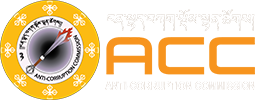a) Conflicts of Interest (CoI)
Management of CoI is one of the anti-corruption tools. Conflicts of Interest occur when the public official’s personal interest competes with the interest of the organization or company. To determine whether CoI is present or would occur if an employee is to participate in a decision or other matter, one must determine whether the employee or a Related Person(s) has a financial or non-financial interest that would be affected by his or her participation.
b) Asset declaration and management
The ACC introduced the system of asset declaration for public officials in 2006 as part of the overall anti-corruption strategy. Asset Declaration (AD) is an important tool to hold public officials accountable. It is a means to anchor the issue of ethics and integrity in the public sector, thus promoting responsibility, accountability and transparency in governance. Asset Declaration is imperative to detect and prevent illicit enrichment as well as manage Conflict of Interest. (https://ads.acc.org.bt)
Who are required to file AD?
- Schedule I: Scheduled public servants; and
- Schedule II: Non-scheduled public servants.
When to file AD?
- Within 3 months after becoming a covered person;
- Annually thereafter between March 1st and April 30th; and
- Before ceasing to become a covered person.
c) Gift Rule 2017
Gift Rule 2017 is a corruption prevention tool designed for prohibiting solicitation, restricting the acceptance, and setting procedures for the disclosure and management of gifts.
d) System Study
System studies are conducted mainly to examine the practices, procedures, and systems of public or private sector entities that are conducive to corruption. In the process, it identifies weak internal controls, systemic loopholes, and recommendations are provided to strengthen systems and procedures. System study is conducted in partnership with relevant public and private entities.
e) Corruption Risk Management(CRM)
Corruption Risk Management is a self-assessment and management tool that helps to identify potential corruption risks in the organizations and proactively prevent them by strengthening internal control systems.
g) Integrity Pact
Integrity Pact is a tool for preventing corruption in public procurement. It is essentially an undertaking executed between the procuring agency and the supplier stating that both the parties will uphold the standards of ethics and integrity during the procurement process. IP establishes mutual contractual rights and obligations of the procuring agency and the supplier to commit to ethics and integrity standards proactively.
